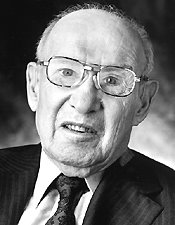Engineer vs. Manager
MANAGEMENT is efficiency in climbing the ladder of success; LEADERSHIP determines whether the ladder is leaning against the right wall - Stephen Covey
 As a tribute to Prof Drucker and to the benefit of the world at large, please find below a few of Drucker's quotes...very inspiring indeed!
As a tribute to Prof Drucker and to the benefit of the world at large, please find below a few of Drucker's quotes...very inspiring indeed!
 Peter Drucker, the most influential management writer of the modern era, has died age 95. A spokesman for the Claremont Graduate University in California, where Prof Drucker worked since the 1971, said he died peacefully on Friday morning after a short illness. Click on this link to read more....http://news.ft.com/cms/s/70b2146e-52f4-11da-8d05-0000779e2340.html
Peter Drucker, the most influential management writer of the modern era, has died age 95. A spokesman for the Claremont Graduate University in California, where Prof Drucker worked since the 1971, said he died peacefully on Friday morning after a short illness. Click on this link to read more....http://news.ft.com/cms/s/70b2146e-52f4-11da-8d05-0000779e2340.html
 I recently read an article on the web which stated that more than half of female workers have already left or are seriously considering escaping conventional 9-to-5 working in a bid to invent their own working patterns, according to a report. This survey was conducted by Hudson HR Consultancy of UK where more than 1,000 UK employees and 500 employers have found that the majority (84 per cent) of professional women believe the 9-to-5 routine is being spurned by their gender! They are instead preferring to follow a career path offering flexibility and professional autonomy rather than fit in with the demands of the corporate world and this includes planning to set up their own businesses, retrain, work flexibly or pursue a "portfolio" career.
I recently read an article on the web which stated that more than half of female workers have already left or are seriously considering escaping conventional 9-to-5 working in a bid to invent their own working patterns, according to a report. This survey was conducted by Hudson HR Consultancy of UK where more than 1,000 UK employees and 500 employers have found that the majority (84 per cent) of professional women believe the 9-to-5 routine is being spurned by their gender! They are instead preferring to follow a career path offering flexibility and professional autonomy rather than fit in with the demands of the corporate world and this includes planning to set up their own businesses, retrain, work flexibly or pursue a "portfolio" career.
 The RISK PREMIUM is the excess return above the risk-free rate that investors require as compensation for the higher uncertainty associated with risky assets. The five main risks that comprise the risk premium are business risk, financial risk, liquidity risk, exchange-rate risk and country-specific risk. All these five risk factors have the potential to harm returns and, therefore, require that investors are adequately compensated for taking them on.
The RISK PREMIUM is the excess return above the risk-free rate that investors require as compensation for the higher uncertainty associated with risky assets. The five main risks that comprise the risk premium are business risk, financial risk, liquidity risk, exchange-rate risk and country-specific risk. All these five risk factors have the potential to harm returns and, therefore, require that investors are adequately compensated for taking them on.

I read a few quotes on SUCCESS and thought I could share it with ROW (rest of the world). Hope u enjoy reading these…
a) Success is never final. Failure is never fatal. Courage is what counts. - Sir Winston Churchill
b) Though no one can go back and make a brand new start, anyone can start from now and make a brand new ending. - Anonymous
c) Many of life's failures are people who did not realize how close they were to success when they gave up. - Thomas Edison
d) Too many people overvalue what they are not and undervalue what they are. - Malcolm Forbes
e) Not every successful man is a good father. But every good father is a successful man. - R. Duvall
f) The tragedy in life doesn't lie in not reaching your goal. The tragedy lies in having no goal to reach. - Benjamin Mays
g) Victory belongs to the most persevering. - Napoleon
h) I think a hero is an ordinary individual who finds strength to persevere and endure in spite of overwhelming obstacles. - Christopher Reeve
i) What comes out of you when you are squeezed is what is inside you. - Wayne Dyer
j) Character is like a tree and reputation like its shadow. The shadow is what we think of it; the tree is the real thing. - Abraham Lincoln
As Vince Lambardi rightly said "The difference between a successful person and others is not a lack of strength, not a lack of knowledge, but rather a lack of will." Do you have the will to make it BIG?